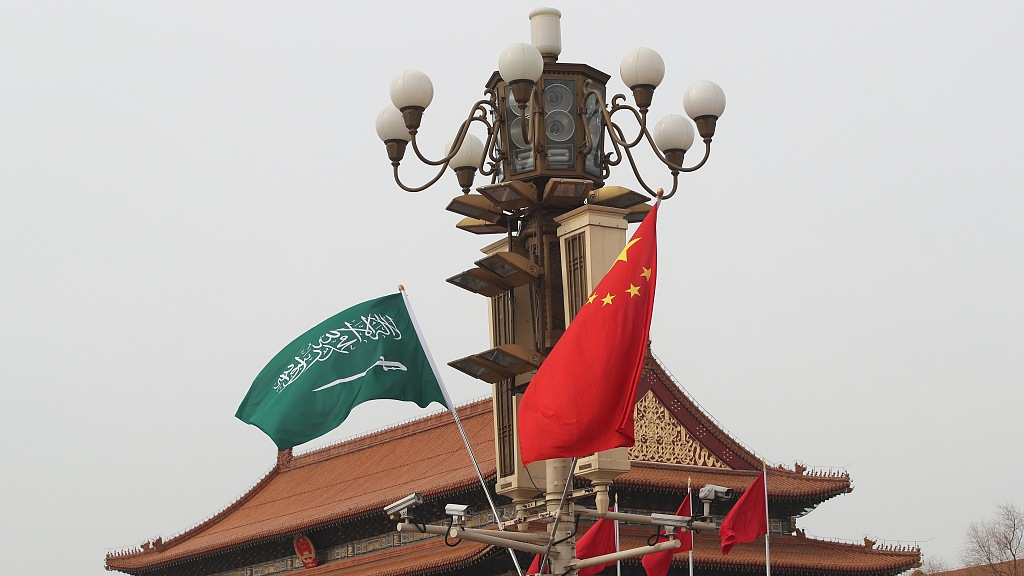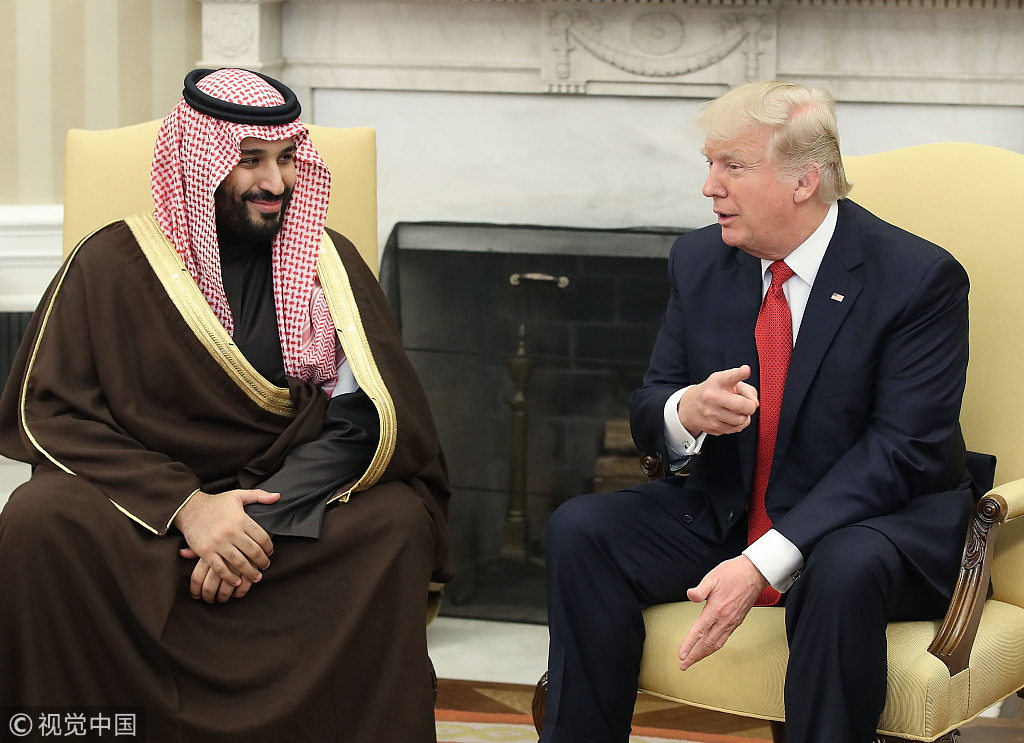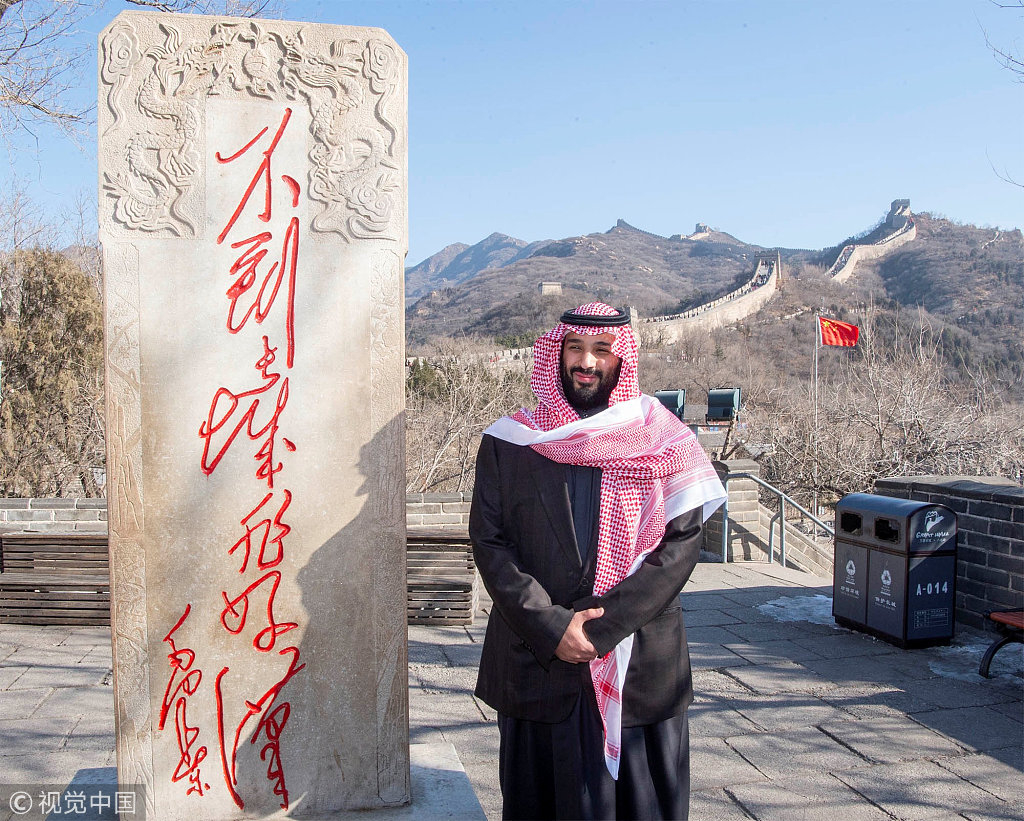
Opinion
20:51, 22-Feb-2019
Is Saudi Crown Prince's visit to Asia a political tour?
Updated
21:20, 22-Feb-2019
Wang Jin

Editor's note: Wang Jin is a research fellow at the Charhar Institute. The article reflects the author's opinion, and not necessarily the views of CGTN.
When meeting with Saudi Arabia's crown prince Mohammed bin Salman (MBS) in Beijing on Friday, Chinese President Xi said that China would keep enhancing cooperation with Saudi Arabia and open up a new chapter for China-Saudi relations.
China is one of the stops of MBS's visit to Asia. While many would argue there are political motivations behind his trip, looking for more economic cooperation with Asian states is the real purpose of MBS's visit.
The argument of political concerns does stand. Traditionally, the foundation of Saudi Arabia's foreign policy is its ties with the U.S. During the Cold War, Saudi Arabia stood firmly with the U.S. to resist both the threat of the Soviet Union from the north and the Arab socialism upheld by Egypt from the west. After the Cold War, Saudi Arabia supported U.S.' military operations against Iraq in 1991; they also established a close cooperation mechanism to combat terrorism and extremism in the region.

U.S. President Donald Trump, speaks with Mohammed bin Salman, the Kingdom of Saudi Arabia's deputy crown prince and minister of defense, in Washington, D.C., U.S., March 14, 2017. /VCG Photo
U.S. President Donald Trump, speaks with Mohammed bin Salman, the Kingdom of Saudi Arabia's deputy crown prince and minister of defense, in Washington, D.C., U.S., March 14, 2017. /VCG Photo
However, during the past decade, the bilateral ties between Saudi Arabia and the U.S. have been challenged. The Saudi citizens' involvements in the "911" terrorist incident cracked the trust between the two states; America's neutral attitude in the "Arab Spring" and Syrian civil war also raised Saudi's doubt over America's influence in the Middle East. Since the U.S. has become an oil-exporting state due to the development of shale oil, the U.S. is less willing to directly intervene in Middle East affairs.
Therefore, it is necessary for Saudi Arabia to seek more connections with other world powers, especially with Russia and China, to extricate itself from over-dependence upon America's assistance and help.
The direct motivation behind MBS's visit to Asia is to accelerate the transformation of Saudi Arabia's own economic structure and seek new economic cooperation opportunities and foreign investments to construct the "2030 Vision," which was put forward by MBS himself in 2017 to diversify the Saudi economy.

Saudi Arabia's Crown Prince Mohammed bin Salman poses for the camera during his visit to the Great Wall of China in Beijing, China, February 21, 2019. /VCG Photo
Saudi Arabia's Crown Prince Mohammed bin Salman poses for the camera during his visit to the Great Wall of China in Beijing, China, February 21, 2019. /VCG Photo
The economic foundation between Saudi Arabia and East Asian states, especially China, Japan, India and the Republic of Korea, is the oil industry. Asian states have become the most important oil-exporting destinations for Saudi Arabia. Among the country's Asian partners, China is its biggest trade partner.
Riyadh hopes to encourage more in-depth energy cooperation with Asian partners. MBS signed an agreement with Pakistan to construct an oil refinery in the coastal city of Gwadar, where China is building a port to facilitate closer energy ties with Asian states.
Recently, Saudi Arabia announced its industrial plan to invest over 400 billion U.S. dollars to stimulate its logistics industry. Many planned industrial zones in Saudi Arabia would need foreign investment.
When Saudi Arabia's "2030 Vision" meets China's Belt and Road initiative, there would be countless opportunities that will benefit both Chinese and Saudi people.
(If you want to contribute and have specific expertise, please contact us at opinions@cgtn.com)

SITEMAP
Copyright © 2018 CGTN. Beijing ICP prepared NO.16065310-3
Copyright © 2018 CGTN. Beijing ICP prepared NO.16065310-3